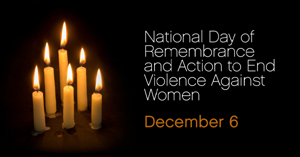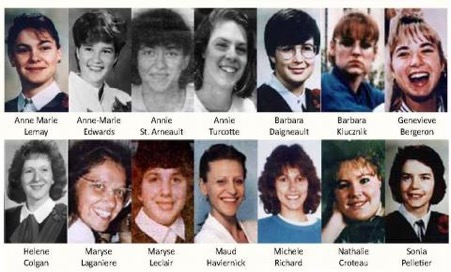
Monday December 6, 2021 | VICTORIA, BC
by Mary P Brooke, Editor | Island Social Trends
[See Livestream link to 5 pm Candlelight Vigil, Dec 6, 2021]
It has been over 30 years since the murder of 14 young women at École Polytechnique in Montreal (December 6, 1989). This act of violent misogyny shook our country and led Parliament to designate December 6 as The National Day of Remembrance and Action on Violence Against Women.
That mass femicide, though carried out by a lone male, is seen to have grown out of a societal environment of gender inequity, misogyny, colonialism, racism and other intersecting systems of oppression. All the victims (those killed and those injured) were women students in areas of engineering and STEM (science, technology, engineering and math).
The patriarchal system still adhered to in Canadian culture is among the root causes of the oppression and backlash against women. But also, within that, there’s a pecking order for men against which oppressed males fight back (unfortunately often on those closest to them).
Misogyny as a viewpoint can be viewed under the broader umbrella of mental health. It stems as well from socioeconomic causes of inequity and gender roles.
On December 6, 2021 again we remember these women who were murdered only because they were women:
- Geneviève Bergeron
- Hélène Colgan
- Nathalie Croteau
- Barbara Daigneault
- Anne-Marie Edward
- Maud Haviernick
- Maryse Laganière
- Maryse Leclair
- Anne-Marie Lemay
- Sonia Pelletier
- Michèle Richard
- Annie St-Arneault
- Annie Turcotte
- Barbara Klucznik-Widajewicz
As we mourn their loss and remember their lives, we reaffirm our commitment to fight the hatred that led to this tragedy, and the misogyny that still exists today, it is stated on the Government of Canada website about The National Day of Remembrance and Action on Violence Against Women.
In Canada and around the world, women, girls, 2SLGBTQQIA+ (two-spirit, lesbian, gay, bisexual, transgender, queer, questioning, intersex, asexual, plus) and gender diverse individuals face unacceptable violence and discrimination. Gender-based violence in Canada has been magnified and amplified by the COVID-19 pandemic. There have been reports from police services, shelters, and local organization of an increase in calls related to gender-based violence across Canada during the pandemic.
The National Day of Remembrance and Action on Violence Against Women is about remembering those who have experienced gender-based violence and those who we have lost to it. It is also a time to take action. Achieving a Canada free from gender-based violence requires everyone living in this country to educate themselves and their families and communities on gender-based violence, centre the voices of survivors in our actions and speak up against harmful behaviours.
December 6 falls within the 16 Days of Activism Against Gender-Based Violence. Add your voice to the conversation between November 25 and December 10 and share the ways you are being part of the solution to end gender-based violence using the hashtag #16Days.
Action in BC:
In Victoria this evening, there will be a candlelight vigil on December 6, 2021 held indoors in the Hall of Honour at the BC Parliament Buildings at 5 pm. In attendance will be Parliamentary Secretary for Gender Equity Grace Lore (MLA for Victoria-Beacon Hill), and MLAs Katrina Chen (Minister of State for Child Care) and Brenda Bailey (Parliamentary Secretary for Technology and Innovation), and invited guests. Livestream on YouTube.
Lore says that BC has a gender-based action plan “working across government” with essential programs including in housing and “providing places to go and find safety” if women find themselves in danger of domestic violence, she told Island Social Trends on November 26 at the start of 16 days of activism leading up to The National Day of Remembrance.
An investment has been made in these women’s shelters (built in various undisclosed locations). But it’s not yet clear what government is doing to address the root causes of why men attack women (often in intimate or domestic relationships), which clearly is a social if not socio-economic problem.
“What actions to take next is still being worked out by government,” said Lore. “Where we are and where we need to be,” is the direction of the work. She adds that municipalities also have a role to play in supporting various services around gender-based violence; shelters for women are often located and funded with the support of municipalities.
Lore notes that domestic violence has increased during the pandemic, as people were contained in their homes for longer periods of time.
Young women impacted:
“Young women are disproportionately affected by sexualized violence,” said Lore. She notes that most of the sexual violence on post-secondary campuses happens within the first few weeks of the first semester, which again indicates a socialization issue.
Lore outlines that messaging on campuses is directed “at everybody”, including through social media and with signage at bars on campus. Some of that signage says “flirting is not yes” and “a third date is not yes”; walking a woman home “is not yes”, says Lore.’
Parliamentary Secretary for Gender Equity:
BC’s first Parliamentary Secretary for Gender Equity from 2017 through 2020 was Mitzi Dean (MLA for Esquimalt-Metchosin) who is now the Minister of Children and Family Development.
Lore was first elected in October 2020 and given the Parliamentary Secretary for Gender Equity role right away, based on her long-time activism for addressing sexual violence in communities. She has been a dedicated anti-violence advocate, university instructor and community organizer. At the University of Victoria, Grace Lore taught Canadian politics, gender and politics, and research methods. Her research has focused on social media harassment and online violence.
Cultural normalization:
In Canada and the USA there is a high degree of sexualization in advertising, movies and on the Internet. “We need to be really cautious about how violence is portrayed as normalized or acceptable,” Lore told Island Social Trends.
If men see violence against women in visual imagery, that helps desensitize the violence. Women similarly become perhaps numbed to the presence of the violence imagery all around them in daily life.
Femicide, which refers to the sex/gender-related killings of women and girls, does not occur out of the blue, it was stated by four authors at The Conversation in an article this past weekend.
The four authors (who are female university professors at Western University, University of Guelph, and Concordia University) say that “although media often portray femicides as spontaneous ‘crimes of passion’ when men kill their female partners, these femicides are the culmination of a history of violence in more than 70 per cent of cases — and are more often crimes of control”.
Killings are also often more likely to be premeditated than non-intimate partner killings. “So many of these deaths are preventable, and we must use every tool at our disposal to increase public awareness and enhance prevention,” the writers state.
“Public health efforts around the COVID-19 pandemic have illustrated the importance of clear messaging, prioritizing expert voices and holding political leaders and social institutions to account to save lives,” the profs write.
Role of news media:
The news media has a role to play in covering femicide, not only with accuracy and in providing awareness and education generally, but also in actively shaping the construction of attitudes and beliefs that can help prevention efforts.
Highlighting social and community solutions is part of how media can play a positive role.
===== ABOUT THE WRITER:
Island Social Trends Editor Mary P Brooke has operated her own news publications on the west shore since 2008. Before that she created the Writing for Business and Journalism curriculum for the Western Academy of Photography in the 1990s and then the MapleLine Journalism Program (for youth) in 2010. She had her own business newspaper in Regina in the mid-1980s. Mary has been active in promoting the rights of women since her university days, where she started a women’s organization and studied sociology alongside science and community education. Ms Brooke holds a B.Sc. and a Certificate in Public Relations. She is the mother of four grown children.
===== RELATED:
Working against gender-based violence highlighted on Dec 6 anniversary (December 6, 2020)
More evident violence against women during COVID sparks social and legislative support (November 25, 2021)
Parliamentary secretary’s statement on Transgender Day of Remembrance (November 20, 2021)
Editorial: Women’s Day marches awkwardly forward (March 8, 2021)
BC Green Leader remembers Montreal Massacre (December 6, 2019)








